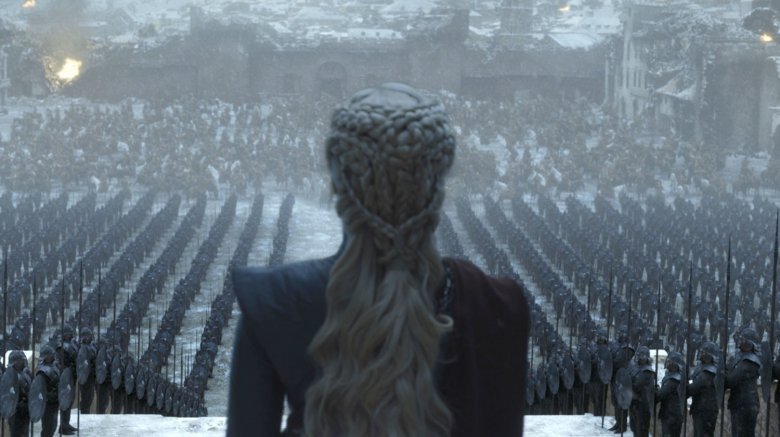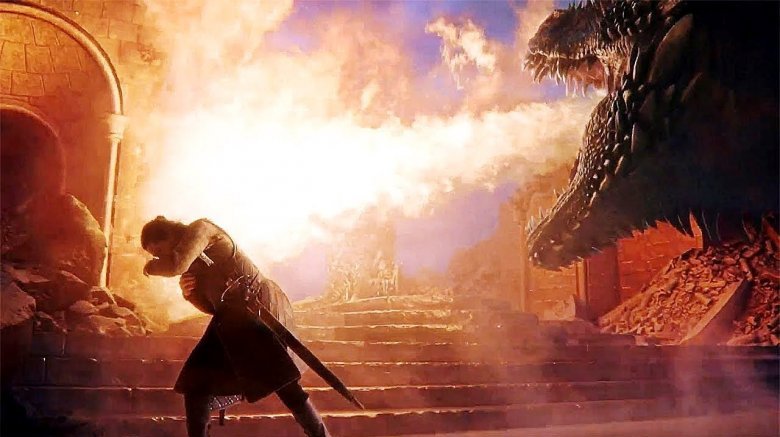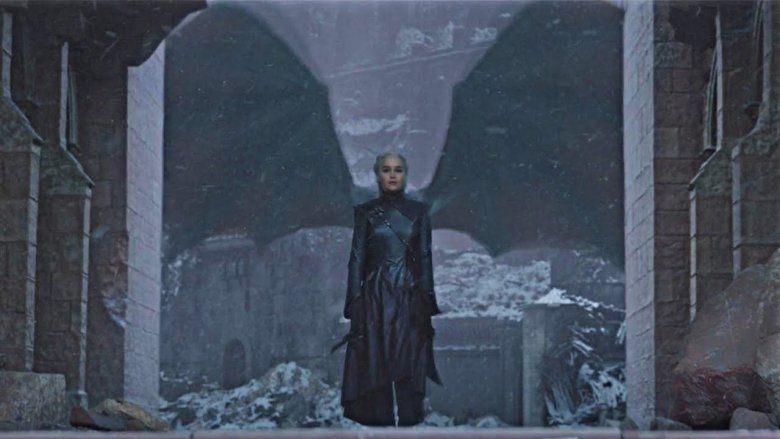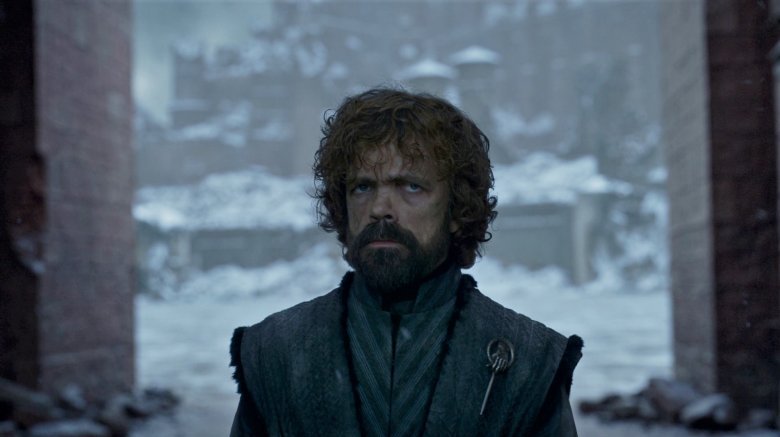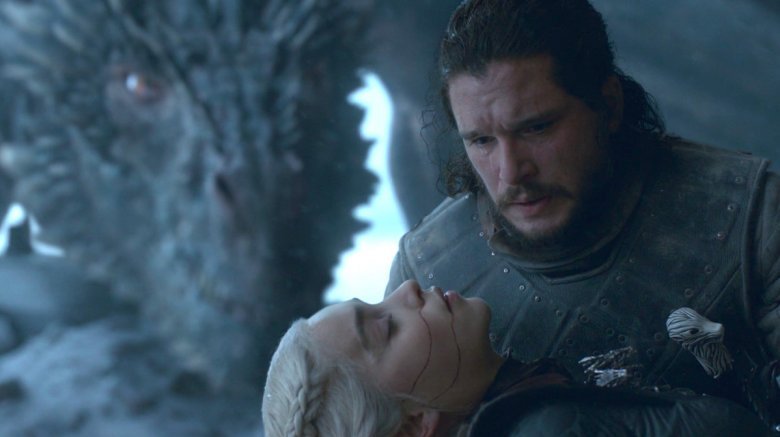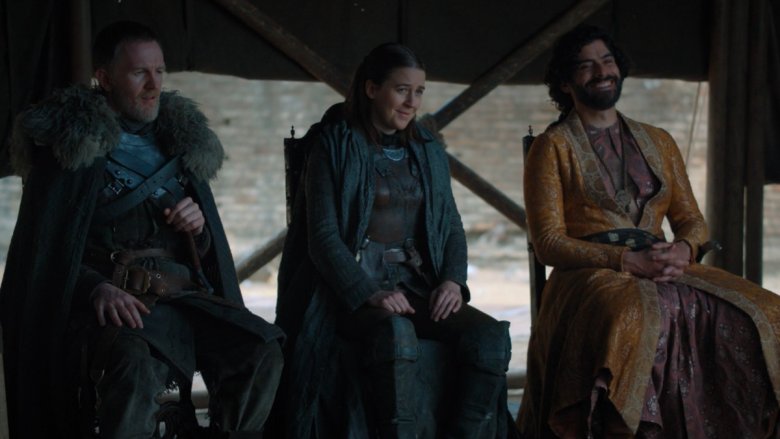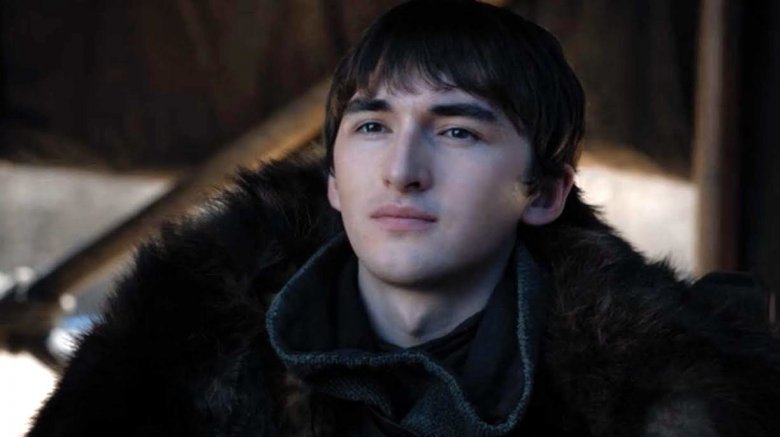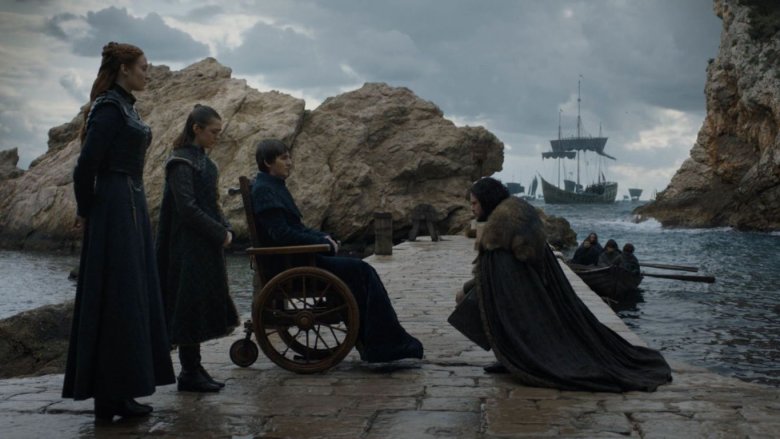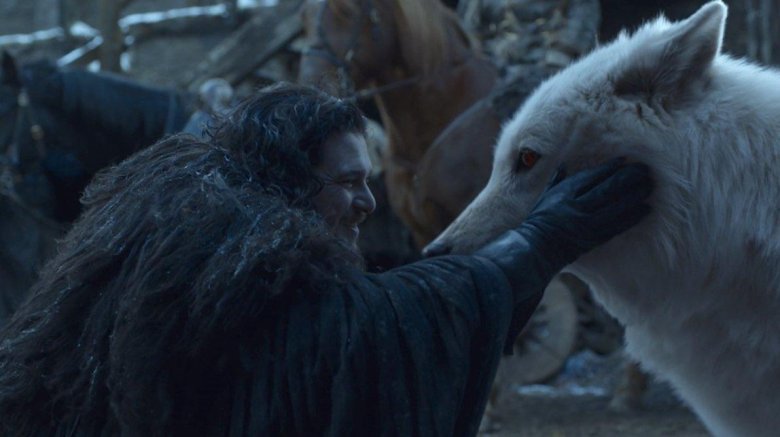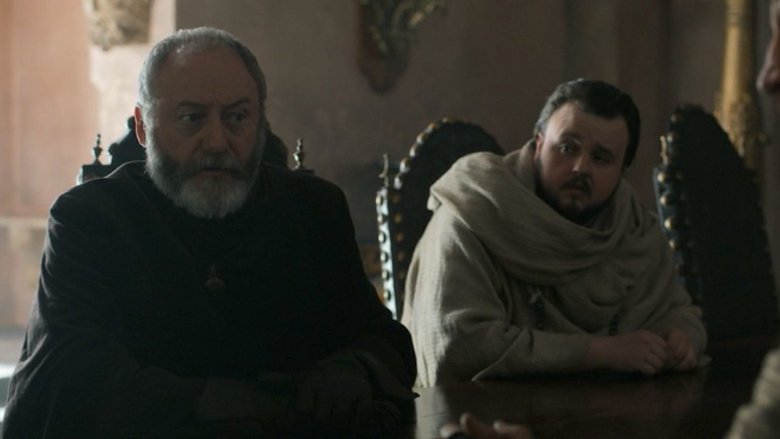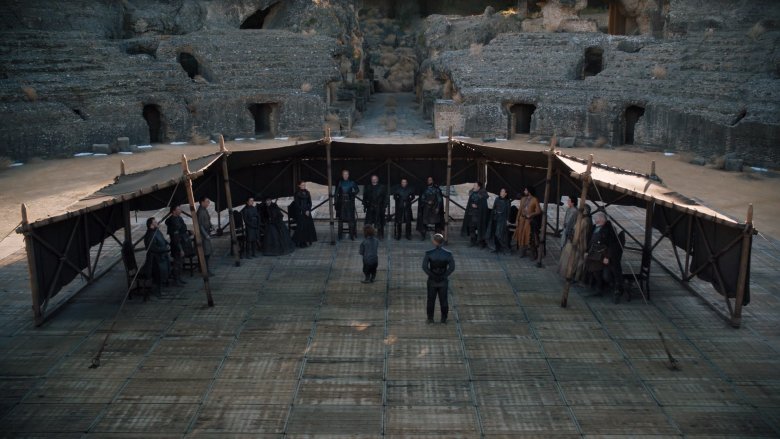Hidden Details Discovered In The Game Of Thrones Finale Script
In the aftermath of Game of Thrones' polarizing final season, some fans were left unsatisfied — and they weren't exactly quiet about it, taking to the internet to voice their concerns. (One group even petitioned HBO to hire "competent writers" after the finale aired, though they were ultimately unsuccessful.) After eight seasons, the team behind this juggernaut of a show, which drew audiences in thanks to its action set pieces, gripping performances, and intricate storylines, learned just how difficult it is to offer an ending that satisfies everybody.
However, the Emmys clearly still want to reward the show, which still holds the most Emmy Awards of any show in television history, for its momentous final season: in July of 2019, it racked up a staggering 32 nominations. Since the finale was recognized for its writing, the final script, written by showrunners David Benioff & D.B. Weiss, was released in August 2019, and there's plenty more to unpack in this potentially award-winning script even though the finale aired way back in May. Here are some hidden details discovered in the Game of Thrones finale script, from odd jokes to Rolling Stones references.
Why Drogon burned the Throne
After the Game of Thrones finale aired, fans hurried online to try and find an answer to one huge lingering question about the Iron Throne and its destruction. During the episode, shortly after Jon Snow (Kit Harington) murders his aunt, girlfriend, and queen Daenerys Targaryen (Emilia Clarke), her last remaining dragon, Drogon, shows up, and it seems as if Jon's time is finally up. However, instead of killing Jon in retribution, the dragon turns his flame on the Iron Throne, melting the ultimate symbol of power and destroying the prize that nearly every character fought to win throughout the show.
Some fans theorized that Drogon actually knew what the Iron Throne was and what it represented, which is why he burned it to the ground, but other fans argued that a dragon understanding symbolism was a pretty ridiculous idea. As it turns out, the latter camp was right; in the finale's script, Benioff and Weiss note that Drogon wants to burn the "world," not the Throne, writing, "We look over Jon's shoulder as the fire sweeps toward the throne — not the target of Drogon's wrath, just a dumb bystander caught up in the conflagration." Looks like dragons aren't as smart as people thought, but at least the answer wasn't that Drogon just wanted to destroy anything pointy he spotted in his immediate path.
Daenerys' newest title
Even though it seemed inevitable that Daenerys would end the series by stepping into her father's shoes to become the Mad Queen (in case you're behind on your Game of Thrones lore, her father, Aerys II Targaryen, earned the moniker of "Mad King" during his reign), most fans were disappointed by the way Daenerys descended into full-fledged insanity. The Dragon Queen spent seasons torching enemies, but it usually felt righteous as she killed evil slave owners or oppressive men, making it all the more troubling when, in the penultimate episode of the show, she set fire to King's Landing, killing thousands of innocent men, women, and children without hesitation.
Apparently, the writers added yet another title to Daenerys' lengthy list, which includes Mother of Dragons and Breaker of Chains: Her Satanic Majesty, a nickname they bestow upon her as she greets her army in the aftermath of her attack on Westeros' capital. Per the direction, "For a moment, Drogon's unfolding wings spread behind her back, an unsettling image. Her Satanic Majesty's Request."
This new title has some significance behind it — specifically, it's a reference to the Rolling Stones' album Their Satanic Majesties Request, as well as yet another confirmation that Daenerys has officially gone insane. The reference makes some sense, but it's just interesting to know that the Stones made their way into the Game of Thrones finale script one way or another.
History and pop culture come together
The Rolling Stones aren't the only piece of pop culture mentioned in the Game of Thrones finale script. A well-known film found its way in as well, as well as a reference to one of the most infamous nuclear attacks in history.
The finale opens with Tyrion Lannister (Peter Dinklage) surveying the damage of King's Landing in the aftermath of Daenerys' brutal siege, finding charred bodies of men, women, and children amidst the rubble of the capital's once-beautiful buildings. As he wanders through the wreckage, the script notes that the camera stays on him even though he's surrounded by Daenerys' forces, including Jon Snow, and the directions read, "We follow him Son of Saul style, tight on his face as he passes through the gates." A few lines later, the directions say, "Human silhouettes on the dragon-scorched ground where the ashes have blown away, the negative image of the Hiroshima silhouettes."
Pretty much everyone is familiar with the bombing of the Japanese city of Hiroshima during World War II, but Son of Saul is also an important reference, since the film focuses on the Holocaust. Between the two, the script paints a picture of ultimate destruction, making it clear just how far Daenerys went in her quest for power.
Daenerys doesn't get a say
Right from the beginning, it was clear that Game of Thrones would center itself around the story of Daenerys Targaryen, who starts the series as a naive, frightened child bride before growing into a ruthless, justice-driven warrior. Born royalty, Daenerys knew from childhood that the Iron Throne was hers to take, thanks to her highborn name and status as one of the only trueborn heirs left in Westeros and beyond. Unbeknownst to her and most viewers (until later seasons), her eventual lover, Jon Snow, is actually her nephew and the son of a Targaryen prince, giving him an even bigger claim and setting up a huge conflict as the show moved into its final season and this secret was revealed.
Ultimately, Daenerys achieves her goal of overtaking the Seven Kingdoms, making her way into the Throne Room after her successful attack on King's Landing, but before she can assume the storied seat of power in the Game of Thrones finale, Jon kills her for the good of the realm. However, during this whole scene, the script is notably mute about Daenerys' point of view from the second Jon enters the room, giving all the character development to him even as one of the show's biggest characters meets a grisly end. If fans were upset at Daenerys' lack of dialogue during the siege of King's Landing, it probably doesn't help knowing the dragon queen didn't even get an inner monologue while she was stabbed to death.
A Prince has no name
Game of Thrones' occasional jaunts to Dorne, an independent kingdom on the outskirts of Westeros, were some of the most maligned subplots throughout the show — while fans understood the desire to show a different region, they were often bored and disappointed by Dorne's lackluster characters and plots, particularly after the kingdom's most interesting citizen, Oberyn Martell (Pedro Pascal), lost his life in a trial by combat defending Tyrion.
Dorne fell by the wayside after both of its princes, Doran and his son Tristane, were murdered by Ellaria Sand (Indira Varma) and her three formidable daughters (who later all lost their lives to Lannister forces). With basically no Dornish characters left, viewers largely forgot about Dorne until the finale, when a new Dornish character popped up.
During the final council that decides the fate of Westeros' monarchy, a few characters make appearances, including a "new Prince of Dorne" alongside "several ND [no dialogue] lords." Just in case audiences weren't sure that Dorne has basically no importance to Game of Thrones' overall plot, the new Prince never even gets a name, nor does he speak at all during the scene. Dorne might have been disappointing, but turning its prince into a glorified extra might be a bit much.
All hail Bran the Bizarre
Fans were understandably miffed when, after years of building tension about who would take the Iron Throne, the anticlimactic answer in the Game of Thrones finale is, at first, nobody (since the Throne itself is gone), and eventually, Bran Stark (Isaac Hempstead-Wright), the remaining male heir of the Stark clan who loses the use of his legs in the pilot. Bran starts the show as a relatively normal kid, but after a journey beyond the Wall to become the omniscient, all-knowing Three-Eyed Raven, he becomes one of the show's oddest characters, spending most of his time onscreen making creepy comments or staring into space.
As it turns out, the creators think Bran is just as weird as everybody else does. Twice in the finale script, Benioff & Weiss reference Bran's oddity; at the final council, when Tyrion asks Bran if he will accept his new title as king, Bran says, "Why do you think I came all this way?" The direction that follows reads, "A strange response but Tyrion has come to expect strange answers from Bran." Toward the end of the episode, during a small council meeting when Bran says he may be able to track down the now-missing Drogon, the script reads, "That's weird. But so is the new king." Bran was odd enough to begin with, but it seems like the creators really wanted to drive that point home — and it's easy to see why Hempstead-Wright initially thought the script was a joke.
A few mood-lifters
During its time on television, Game of Thrones quickly developed a reputation for being one of the most brutal and often upsetting shows on television, thanks to plenty of murder, assault, sadistic characters, and horrible happenings. Fans learned early on that they shouldn't pick a favorite character lest they end up viciously murdered, and during some episodes, there was little to no room for comedy.
Certainly, characters like Tormund Giantsbane (Kristofer Hivju) lightened the mood from time to time, but Benioff and Weiss clearly wanted to bring a little levity to their final script, and they threw in a few jokes with varying degrees of success. During the small council meeting at the end of the Game of Thrones finale, when Tyrion finds out he's not included in the recently written history of the War of the Five Kings, the script actually adds some profanity as he futilely pages through the tome looking for his name. Just before that, as Jon says goodbye to Bran and their sisters Arya (Maisie Williams) and Sansa (Sophie Turner), Arya announces her intention to figure out what's west of Westeros, and the following direction reads, "Jon and Sansa look at each other. They both failed geography." In both instances, the jokes fall a little flat, but at least Benioff and Weiss gave comedy a shot before the show ended.
Back in black
As the Game of Thrones finale comes to a close, the focus swings back to the surviving members of the Stark clan — which feels appropriate, considering that the family was one of the first houses audiences met during the pilot. Despite harrowing journeys and plenty of hardship, the remaining Starks end up exactly where they're meant to be: Sansa is crowned Queen in the North, which remains an independent kingdom; Arya, the adventurer, boards a ship to discover the rest of the world; and Jon Snow, the supposed bastard of the Stark family, returns to his longtime home north of the Wall.
Debates raged about what exactly Jon was doing north of the Wall once more — though he's banished back to the Night's Watch as punishment for killing Daenerys, the Night's Watch doesn't really need to exist now that the threat of the White Walkers has been eliminated (thanks to Arya). Some thought he might have taken up the mantle as the King Beyond the Wall, who rules over the free folk, but the script is extremely clear about Jon's fate, unequivocally calling him a "Night's Watchman" and putting an end to this particular argument.
Sam's qualifications are a little shaky
Sam Tarly (John Bradley), who began the show as Jon Snow's often frightened and seemingly weak friend in the Night's Watch, took quite the journey during Game of Thrones. After time spent at the Citadel with the Maesters, the most learned men in all of Westeros, Sam achieves his ultimate goal and becomes a Grandmaester himself, showing up in the final episode dressed in Maester's robes and carrying his latest accomplishment: A Song of Ice and Fire, which chronicles the just-finished War of the Five Kings (and, not coincidentally, shares a name with the books upon which the series is based).
Maesters also wear chains that designate which skills they've mastered during their training, and eagle-eyed viewers will notice there's a bit of an issue with Sam's chains and how they're described in the final script. When Sam enters the small council chamber, the script notes, "he wears the Grandmaester robes and a chain with a single healing link." It can be assumed that Sam earned that particular link when he cured the late Jorah Mormont (Iain Glen) of greyscale, but it would be impossible for Sam to rise to the rank of Grandmaester — a title reserved for the most senior and wise members of the Citadel — considering he took a wife, didn't finish his training, and broke basically every rule along the way while still earning just one single link.
The tribe has spoken
The council meeting that decided the next monarch of Westeros takes place roughly halfway through the Game of Thrones finale, bringing together the most important surviving characters as they decide the fate of the Seven Kingdoms. With so many familiar faces in one place, the cast had a lot to play with and chew on, and the script notes make it even clearer why particular characters cast their votes for Bran to take control of Westeros.
Edmure Tully (Tobias Menzes), Bran's uncle, is "still be [sic] miffed he wasn't given serious consideration, but he expects he'll have influence at court if his crippled nephew is ruling." Meanwhile, Gendry (Joe Dempsie), the recently anointed Lord of the Stormlands, "is happy to go along." Yara Greyjoy (Gemma Whelan), the last surviving Greyjoy and leader of the Iron Islands, apparently "has heard that her brother died defending Bran. She knows this choice would make Theon [Alfie Allen] happy." Finally, Brienne of Tarth (Gwendoline Christie), the first ever female Knight of the Seven Kingdoms, "is a Stark loyalist and represents House Tarth." Even though audiences knew how everybody voted, a little more insight into the thought process is an added perk of the script's release.
